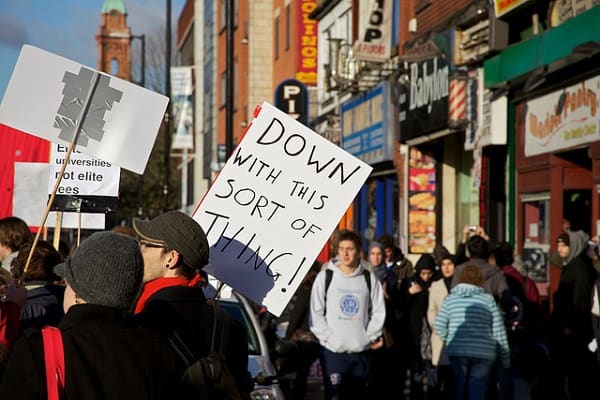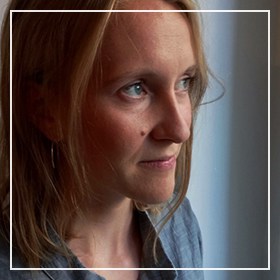This conversation took place after a workshop entitled “Between precarious norms and empowering alternatives – a workshop on the strategies of labour organisation between national and international academic contexts” at the 2017 EASA AGM Seminar. The AnthroCollective Bern invited Carrie Benjamin (SOAS London) and Dan Hirslund (University of Copenhagen & co-initiator of the PrecAnthro group) to give inputs on their own experiences of mobilising against precarious working conditions in their respective academic contexts. Kiri Santer (University of Bern) had a chance to sit down with both speakers to elaborate on some of the points raised during the workshop.
KS: The last two days of the EASA seminar ‘On Politics and Precarities in Academia’ included a lot of difficult discussions on the deterioration of working conditions for non-tenured academic staff across Europe in the social sciences. In what follows, I would like to discuss some of the more hopeful sides of these conversations; that is how academics have been active in fighting against the casualisation of their labour. Therefore, I would like to start by asking you to tell us more about your personal experiences with struggles against the deterioration of academic labour conditions.
CB: Since 2014 I’ve been involved in a campaign called Fractionals for Fair Play (FFFP) at SOAS university of London, where I completed my PhD and was employed as a part-time lecturer. You heard correctly: it is Fair play not Fair pay because our campaign is not just about payment for part time fixed term teaching staff at SOAS but also about gaining recognition within our university for the work that we do more broadly. We are fighting for both fair treatment and acknowledgement.

Our campaign recently won a major victory in our struggle for getting paid for essay marking. This has come out of a long series of mobilisations. In January 2014 FFFP was formed by a number of non-tenured, adjunct staff and we entered into negotiations with the management of the university. We were asking for better working conditions and especially, we were demanding to get paid for essay marking. But management refused to listen to our demands. So, in April 2014 FFFP started a marking boycott and for six weeks we refused to mark essays. After six weeks, management sat down with us and offered us improved contracts to pay for lecture attendance, office hours and mandatory post graduate teacher training. This new contract didn’t cover our core concerns over essay marking so we rejected it.
Over the next three years, we worked on mobilising our base, gaining support for the campaign and making sure that each academic year staff and students knew who we were and what our core demands were. We used different techniques: protests, badges of support worn around campus and disclaimers in essays such as ‘this essay has been marked by unpaid labour’. With the support of our union we put forth a pay claim in summer 2016 and after several unsuccessful meetings with management we started thinking about withholding our labour again. We circulated a pledge and asked people to say if they were willing to withhold their labour.
In the end, we withheld over 3’300 essays—essentially shutting down four departments across the school. All the departments issued statements stating their support for our actions. In the end, the management didn’t have any other option than to capitulate to our demands of paying us for marking essays.
DH: My struggle starts from a rather different problematic than Carrie’s. The concern in our campaign has been more about the locked career paths for postdocs. Because of the increase of funding for PhDs and post-docs in Denmark over the past decades, we are facing an overproduction of personnel. Thus, our struggle has more to do with the reproduction of careers and the issue of temporality. Postdocs in Denmark do not face precarity so much in terms of wages. But they are being forced into temporary contracts.
We started with a petition to management asking them to address our concerns over career development and asking them about their strategies for the employment of post-docs. It seemed like they didn’t have one at all. Our demands cover the opening up of tenure track positions, the permanent integration of postdocs into departments and the creation of more visibility around their possibilities for career progression. These are very careerist questions: but it was the only thing we managed to get people to mobilise around. In Denmark, there is a very weak culture of mobilisation—partly because of the success of the welfare state. When I have tried to mobilise post-docs in the past, I have been confronted to almost automatic scepticism. In short, to raise the issue of capitalism is challenging.
Our campaign has then two tracks: one is about postdocs’ career path and the other is about addressing temporality (understand: fixed-term contracts) in academia. We now have an employment representative and we are collaborating with the union to see how we can work together to mobilise more and to create a more permanent, perhaps national, structure to work towards more awareness around these issues.
KS: Could you offer some thoughts about the abilities of unions—in each of your contexts—to cater for casualised and often mobile labour?
DH: Well in Denmark, as in many other contexts, there has been a crisis of union membership. A change in the law has made it impossible to deduce your union membership from your tax declaration and a number of new unions have emerged who do not have collective bargaining power. They are called yellow unions. From our side, we are wary about the co-optation of our movement from the unions. We actually do not have union representation of fractional staff, this is something we are working on. But Danish unions are very non-militant so the idea of raising the possibility of this type of action is difficult. They cater to very traditional forms of labour and address classic issues of labour conditions (pensions, holidays etc.). We wonder if unions are the solution, when our problems are so far from what they usually tackle. And we are asking ourselves whether we need to start looking for alternative models to act collectively. A further problem is that postdocs can’t ‘withhold’ their labour in a classic sense. We only do a limited amount of teaching for example.
Where I think our power really lies is in funding. If we were to work to withhold our funding from universities, we would have quite a lot power. One of the ideas we are developing is to try and pull our funding outside of the university to support people who lose their positions or run out of money; to create academic collectives, so to say.
CB: There has been a national crackdown on unions in the UK which has considerably damaged their work, that is; their ability to bring about change rapidly by facilitating people’s right to withhold their labour legally. New trade union laws in the UK have defined that in order for a strike to be lawful, there needs to be more than a 50% turnout of members within a membership branch as well as a majority in favour of the action. Getting a 50% turnout is really tough since many members are part of the union for case work security, and less for the political aspects of unionising.
I am a member of the FFFP campaign but I am also the representative to the SOAS University and College Union (UCU) branch for fractional staff. This was actually one of the things our campaign also managed to achieve: more representation on the union. Despite this, the campaign has remained quite distant from them. FFFP maintain communication with UCU but we also let them know that we will take action and strike, even if it is unauthorised.

KS: I would like to ask you about broader notions of casualised labour outside of academia and what you think the importance of building links across sectors might be?
CB: In my experience, and I think this applies to many others from the campaign as well, one of the more difficult things to grapple with was my ‘privileged’ PhD student position and rethinking my status as a worker. I really had to re-evaluate teaching, not as an opportunity for myself, but as an opportunity profiting the school, mostly. PhD students and post-docs from the outside are seen as highly educated and mobile; although, we also need to revise mobility as only a privilege, it is also a condition of employment for many of us. Theoretically, we should be able to find work in any sector. But I think we need to look a bit more closely at who is actually occupying these casualised positions. Many of us are migrants and women and I think that this is how we can start to imagine forming bonds with other forms of labour. At SOAS, we collaborated with the Justice for Cleaners campaign. Justice for Cleaners started in 2006 to end the outsourcing of the school’s cleaners. The cleaners – many of them migrant women – didn’t even have negotiation power as they were no longer employed by the school. When we started our campaign, many people raised the point that we are nowhere near as exploited as the cleaners. But I think it is very important that we came together—not to erase differences—but to support each other’s struggles. This enabled us to highlight the fact that we were both being exploited by an institution and within a national context more broadly. In both campaigns, people were forced to sometimes take out multiple jobs to pay the huge rents in London, to take out loans, to undertake extensive commutes because of unaffordable rents in London etc.
KS: We have spoken about issues in national contexts but do we have to elevate the struggle to a transnational context and why?
DH: I will take a short detour to answer your question. Currently in Europe there are all sorts of signs, like rising xenophobia and hate against migrants etc. that point to a lack of political education – at least this is one way of framing it. In my opinion, we need therefore to open up a space for debate about the necessity for the state to create a more robust knowledge society. And if you frame it that way, we need an economy where the state or other institutions can create a more educated civil society. This requires decommodifying the knowledge economy and creating affordable structures for people that are not based on commodified relationships to the market in order to confront market-driven political developments. National states in the EU have tied themselves to the Bologna process and to different forms of EU funding, that are locking them down. They have a very limited space for manoeuvre but if one could generate a new transnational movement to create a space for non-marketised education, to develop a different kind of economy for education, this might begin to push away the market and create a new dialogue around the issue. Precarious work is but one side-effect to market-driven higher-education…
KS: (How) can this struggle for better working conditions offer a radically different future more generally? Are there aspects of your struggles which go beyond bettering working conditions, and how do you conceptualise them?
DH: This is precisely one of the thoughts that keeps nagging me in this struggle is that you either end up fighting for something that is gone (permanent, full time positions) – or you’re asking for an increase in power of the state to create institutional structures that then produce certain types of citizens within a production regime. From a Marxist perspective, this is particularly problematic since this is what Marxism aspires to overcome. So, it feels to me that this struggle can never create a revolution or re-democratise because it always ends up in creating the perfect employee or the perfect state – and this is not very radical…

CB: I have been thinking about this a lot too. But I think that when we talk about precarity and alternatives to precarity it’s not just about what we are able to achieve now but it’s about imagining a different future. Yes, in a way we are fighting for things that no longer exist. Neoliberalism, Reaganism and Thatcherism, have made a reality which at the time existed for very few people—mostly white men—inaccessible for even larger swaths of the population. In the US and the UK respectively, ever fewer workers can retire to the countryside at 64 or 65, and benefit from a solid pension. Despite this, for a lot of people there is a need to imagine new futures, and not to have to keep seeing before them a future of perpetual hopping from job to job without any kind of security.
Thus, we need to start imagining and working for alternative to the future we are currently facing.
KS: To finish on a positive note, I find inspiring the idea you mentioned, Dan, of founding (and funding) academic collectives outside of the university. These might create a space where there isn’t a state sponsored incentive to do certain kinds of work as well as leeway for governance by the people who are directly affected by the commodification of education. In these democratic pockets, there might be a possibility to do things otherwise. Of course, they will not change the society as a whole, but perhaps they can escape this state-market dichotomy you mention. I do see some kind of hope in creating parallel structures where precarious workers are actually in charge of governing. These kinds of initiatives might have the ability to change the institutions in which we are partly employed.
Featured image by NTNU – Norwegian University of Science and Technology’s photostream (flickr, CC BY-SA 2.0).





